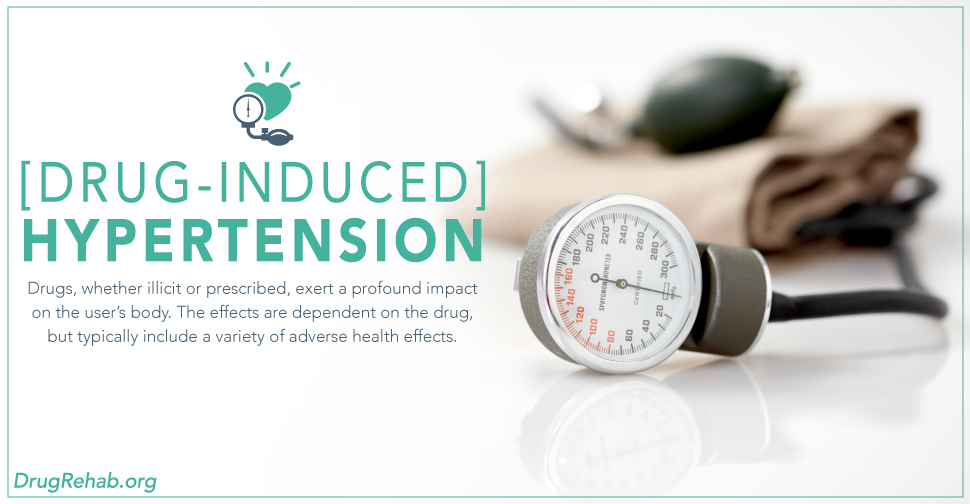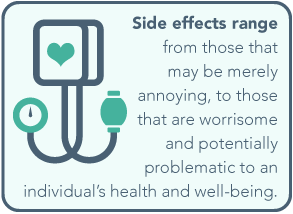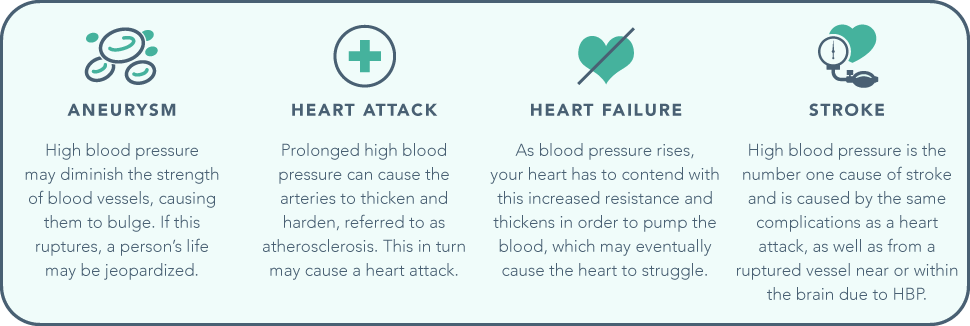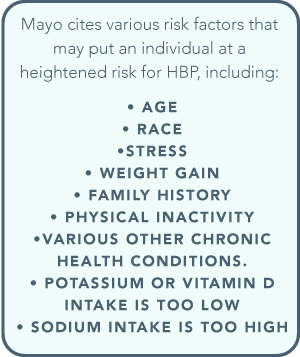
Substance use disorders may cause a person to develop temporary or chronic high blood pressure, or hypertension. This condition may cease if the drug of abuse is stopped, however, it is still very dangerous when present. Hypertension may cause aneurysm, heart attack, and stroke, among other things, and may become deadly. Various medications, such as benzodiazepines may be used to treat acute and severe cases, while other medications may be used for reoccurring forms. Substance abuse treatment should be strongly considered to alleviate this, and other adverse health effects associated with drug abuse and addiction.

Drugs, whether illicit or prescribed, exert a profound impact on the user’s body. The effects are dependent on the drug, but typically include a variety of adverse health effects. Side effects range from those that may be merely annoying, to those that are worrisome and potentially problematic to an individual’s health and well-being. While numerous prescribed medications, used as directed may cause this, substance abuse poses the threat as well. Many forms of drug abuse spike a person’s blood pressure, termed hypertension. Withdrawal from certain drugs of abuse may also cause this condition. Drug-induced hypertension may cause aneurysm, irreversible renal failure, heart attack, heart failure, or stroke.
What Is Hypertension?
Hypertension, or high blood pressure (HBP), is condition which occurs when the force of your blood pushing against the arterial walls is higher than normal. A blood pressure reading is made up of two numbers, which together give a person’s overall blood pressure. These numbers directly correlate to your heart, with the first, or top number, being the systolic number (the pressure reading when your heart beats or pumps blood) and the second, or lower number, being the diastolic number (the pressure reading when your heart is at rest). According to MedlinePlus, blood pressure that is at, or lower, than 119/79 is considered normal, while that which is at, or over, 140/90 is considered high.
Drug-induced hypertension is a form of secondary high blood pressure. Fortunately, secondary blood pressure may resolve if the medication (or drug of abuse) is ceased, however, this is not true in every case.
In more rare cases, and most often when levels become critical, a variety of symptoms may accompany high blood pressure, including chest pain, headaches, nausea, nosebleeds, and shortness of breath. However, typically high blood pressure is usually asymptomatic (without symptoms); for this reason, it is often referred to as the “silent killer.”
What Are The Risks Of Hypertension?
Hypertension can be deadly. In instances of drug abuse, it may be temporary, or in situations of chronic abuse, prolonged. Mayo Clinic outlines the severe and sometimes life-threatening conditions which may result, cautioning that “The higher your blood pressure and the longer it goes uncontrolled, the greater the damage.” If untreated and uncontrolled, hypertension may cause:
Aneurysm: High blood pressure may diminish the strength of blood vessels, causing them to bulge. If this ruptures, a person’s life may be jeopardized.
Cognitive difficulties: A person may have a hard time learning, retaining, or accessing information and struggle to think or understand things.
Heart attack: Prolonged high blood pressure can cause the arteries to thicken and harden, referred to as atherosclerosis. This in turn may cause a heart attack.
Heart failure: As blood pressure rises, your heart has to contend with this increased resistance and thickens in order to pump the blood, which may eventually cause the heart to struggle. This results in insufficient amounts of blood reaching your body.
Metabolic syndrome: This is a group of conditions surrounding and influencing your body’s metabolic state, including “increased waist circumference; high triglycerides; low high-density lipoprotein (HDL) cholesterol, the “good” cholesterol; high blood pressure; and high insulin levels.” Combined, these may contribute to other, serious risks, including diabetes, heart disease, and stroke.
Stroke: High blood pressure is the number one cause of stroke and is caused by the same complications as a heart attack, as well as from a ruptured vessel near or within the brain due to HBP.
Vascular complications in the eyes: Dysfunction within these important sensory organs may occur due to “thickened, narrowed or torn blood vessels in the eyes.”
“Weakened and narrowed blood vessels in your kidneys”: These factors may lead the kidneys to function abnormally, with additional sources citing that irreversible renal failure may occur in the most serious of instances.

Other sources report that hypertension may cause hypertensive encephalopathy, a condition which results when a person’s blood pressure quickly rises, resulting in detriment to a person’s brain functions. Though rare, and typically reversible, this may lead to seizure, coma, or if untreated, death. The American Heart Association also warns that aortic dissection (tearing of the aorta’s inner lining), angina (unstable chest pain), pulmonary edema (fluid accumulation in the lungs), or eclampsia (seizures or coma in a pregnant woman) may occur.
How Does Substance Abuse Create This Effect?
Substance abuse affects the central nervous system, a critical system within your body which is tasked with relegating critical regulatory systems that are responsible for life support, such as respiration, heart rhythms, and blood pressure. According to an article presented by The American Journal of Medicine, drug-induced hypertension may occur from a variety of ways, including, that the drug may:
- Interfere with medications used to lower blood pressure
- Cause a person to retain higher than average amounts of sodium or the fluid volumes
- outside of the cells markedly increases
- Activate the sympathetic nervous system
- Affect the arteriolar smooth muscles (muscles within these vessels)
- Not have a specific or clearly defined impact
In addition, other sources report that changes to certain neurotransmitters, which commonly occurs from drug abuse, may cause hypertension.
 Mayo cites various risk factors that may put an individual at a heightened risk for HBP, including: age, family history, weight gain (becoming overweight or obese), physical inactivity, potassium or vitamin d intake is too low, sodium intake is too high, race, stress, and various other chronic health conditions. Additionally, those who use tobacco or consume an excess of alcohol face increased risks. For individuals experiencing these factors, the necessity in gaining control over their drug abuse is even more pressing. If a person already has a preexisting hypertension, the risk is compounded, and made more dangerous, by the drug abuse.
Mayo cites various risk factors that may put an individual at a heightened risk for HBP, including: age, family history, weight gain (becoming overweight or obese), physical inactivity, potassium or vitamin d intake is too low, sodium intake is too high, race, stress, and various other chronic health conditions. Additionally, those who use tobacco or consume an excess of alcohol face increased risks. For individuals experiencing these factors, the necessity in gaining control over their drug abuse is even more pressing. If a person already has a preexisting hypertension, the risk is compounded, and made more dangerous, by the drug abuse.
What Drugs Cause These Changes?
While not all drugs of abuse may cause blood pressure levels to rise, several of the most commonly abused drugs present these risks. Changes in blood pressure, especially spikes, are so commonly attributed to substance abuse, that labile blood pressure is considered a “red flag” for substance abuse. Labile blood pressure occurs when a person’s blood pressure rapidly, and suddenly, changing from normal to elevated levels. The following drugs of abuse have been linked to concerns of high blood pressure:
Alcohol: Hypertension is associated with chronic alcohol abusers and binge drinking. Some theories also attribute HBP to chronic states of withdrawal in those displaying alcohol addictions.
Amphetamines: Hypertension is exceedingly common with these drug users, with stroke being one of the most predominant concerns.
Cannabinoids: Including, marijuana and hashish, within twenty minutes after smoking, hypertension occurs, which may be of particular danger for those who already experiencing cardiovascular concerns, as explained by the California Society of Addiction Medicine.
Cocaine: Hypertension is common with cocaine users, but may be reduced if other side effects attributable to cocaine are decreased, according to a University of Pennsylvania (Penn) publication which states: “Resolution of anxiety, agitation, andischemia will often lead to resolution of the hypertension.”

Phencyclidine (PCP): Linked to decreases of two neurotransmitters, epinephrine and norepinephrine, which then intensify sympathetic nervous system functioning.
Methylated amphetamines: Often referred to as designer drugs, such as Ecstasy, these hallucinogens may create a hypertensive crisis, a potentially life-threatening condition that occurs when blood pressure spikes rapidly to critical levels.
Lastly, withdrawal from certain drugs of abuse which do not normally pose a threat of hypertension during active abuse, may occur.
How Is This Treated?
When blood pressure is so high that it may become dangerous, treatment may entail a variety of medications geared towards both decreasing the blood pressure and other conditions which may aggravate it, such as anxiety. One of the most common treatments are benzodiazepine drugs, (sedatives that are commonly prescribed for anxiety), due to the way they reduce both the blood pressure and pulse rate. According to the Penn article, for certain drugs, such as cocaine, if this sedation is ineffective, either sublingual or intravenous nitroglycerin or intravenous phentolamine may be administered. Aside from this, if it is a reoccurring condition, various medications may be used to balance the blood pressure on a day-to-day basis.
If the underlying cause of hypertension is substance abuse or addiction, we strongly urge you to seek treatment, so that you can protect yourself from further risks of hypertension and any number of other serious and life-threatening illnesses and diseases linked to substance use disorders.
We Can Help You Lower Your Risk Of Poor Health
Substance abuse and addiction create an array of negative health effects, illness, and disease, many of which, such as hypertension, hold the potential to be deadly. If you’re just beginning to abuse drugs, and would like information or support to aid you in quitting, let us help you. If you’ve found yourself already lost within addiction, we have countless resources to support you in finding sobriety. DrugRehab.org can help you choose individualized treatment that addresses your personal health needs and sobriety goals. Contact us today.
Sources
The American Journal of Medicine — Drug-induced Hypertension: An Unappreciated Cause of Secondary Hypertension
Medscape — Alcohol Consumption and Hypertension
U.S. National Library of Medicine — Effect of phencyclidine (PCP) on blood pressure and catecholamine levels in discrete brain nuclei
Merck Manual — Amphetamines


